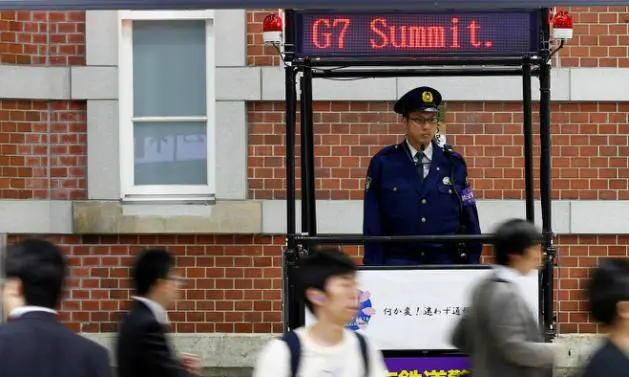After a series of ministerial meetings of the world's seven major industrialized economies, the long-awaited Group of Seven (G7) leaders'summit will finally be held Thursday in Ise-Shima in central Japan covering a series of urgent and important global and regional issues.
Japan, presiding over the Ise-Shima summit, ambitiously vowed it would take"leadership in guiding the world by showing the best path forward to achieve regional and global peace and prosperity"and that the G7"must show the best way toward enhancing sustainable and strong growth of the global economy."
However, considering the numerous problems troubling the Japanese economy, other thorny issues that are lingering over other members and policy divergence within the group, questions have been asked as to the actual influence and significance of the current G7 mechanism.
The G7, as a whole, is no longer represents the global economic engine. Its combined economic value declined to just 47 percent of the world total in 2013 from around two thirds at the beginning of the 21st century as growth potentials reached collective exhaustion.
For the United States, although the performance of the world's top economy is much better now than in 2008 after the financial crisis, the speed of its recovery has remained slow amid political uncertainties; the biggest one being the result of the country's presidential election.
The Japanese economy, the third largest one globally, is still mired in decades-long deflation. Recent key Japanese economic data such as the price index and investment by its big enterprises showed that all three arrows of Prime Minister Shinzo Abe's economic policy mix dubbed "Abenomics" have misfired or missed their target entirely.
European G7 members are weakened by a debt crisis sweeping the continent and although the European central bank launched monetary easing so as to inject liquidity into the substantial regional economy, Germany, one of the engines of the European Union, remains cautious about the move.
However, when the G7 countries have been trapped in their own swamps of stagnancy, dynamic emerging economies such as China and India have gained momentum and played an increasingly important role in firing up the global economy.
The Group of 20 that covers all G7 countries and 13 other major global economies, accounting for some 85 percent of global GDP, is becoming a far more relevant and progressive platform for world leaders to discuss ways to cope with financial crises, better facilitate the recovery of world economy and accelerate reform of international financial and monetary systems.
"Compared to the G7, the G20 is more capable to address such issues, since more regional major countries and emerging economies are involved in," Kaoru Imori, a political science research fellow, told Xinhua, adding that "Because its scope is far broader, it means regional action or intervention is more likely to be actualized."
On global security issues, the G7, particularly the United States, seems do more harm than good. The biased U.S. interference in the Middle East jeopardized the regional balance of power and, to some extent, created the bitter rise of the Islamic State, the world's most pressing terrorism issue, and monumental refugee crisis in Europe -- which itself was attacked by terrorists posing as refugees.
Meanwhile, regarding Moscow's dispute with Kiev over territories, the United States and the major European countries have shut down an important channel to seek dialogue with Russia on resolving the situation in Ukraine by suspending Russia's membership in the Group of Eight.
For the G7 countries, the move definitely expressed their stance on the issue but many balanced political watchers believe it was actually not the right antidote to the strained relations between Russia and Ukraine and that their one-sided mediation was deeply rooted in Europe's fear and U.S. hostility against Russia.
However, Europe could not develop without cooperation from Russia, at least with Russia's natural gas.
German Foreign Minister Frank-Walter Steinmeier voiced prior to the G7 foreign ministers' meeting in Hiroshima in April that he would like to see Russia's return to the group to help settle conflicts in Ukraine and Syria. In the East, the U.S."pivot to Asia" catalyzed some countries into beefing up their military muscles to hyped up uncertainties and disputes in the East and South China Sea without first seeking dialogue to settle the problems.
For the G7 members, observers have said, to cope with the security issues needs more international cooperation especially with disputing parties. For example, cooperation with Russia will be constructive to settle the Ukraine issue and Russia has a strong military machine to deal with the Islamic State and has influence over the Syrian government.
"Technically speaking, the G7 mechanism isn't answerable to any other countries than those involved. That's just technically speaking. If the mechanism were to evolve in the future, more consideration, perhaps, should be given to other countries' concerns," said Imori. "But in any and all situations, the voices of the countries concerned, outside of the G7 framework, should be listened to; this is just a basic humanitarian fundamental," the analyst concluded.
(APD/XH FINANCE)
 简体中文
简体中文

